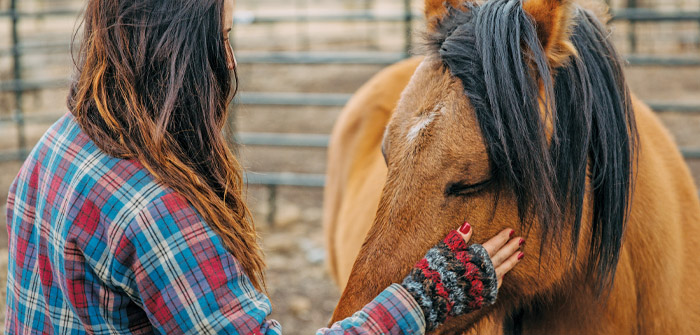(Meghann Harty reaches out to a horse in her “healing herd.” Harty’s new enterprise, Unbridled Courage, takes an equine approach to personal development | Photo by Emily Green)
What’s it like launching new projects in Sisters Country? We interviewed five women who’ve built local businesses within the last five years or so. Here’s a sampling of what they told us.
Kim Hapke, N.D.
Dr. Kim Hapke is a naturopathic physician who landed in Sisters Country in 2014. “A lot of people are here for a healthy, outdoor lifestyle,” she said, “so if they can address a problem naturally, they want to.” Trained at the National College of Natural Medicine and Process Work Institute, she combines naturopathic methods with counseling.
Hapke shares her knowledge with Metabolic Maintenance, a traded-sector nutritional supplement company based in town. “I’ve been working closely with R&D recently,” she said. “It’s product development, researching new ingredients, providing the doctor perspective on what is exciting and what areas need better answers for patients — that’s a perspective I can bring from having my own practice.”
She described moving from Portland to a small town as “amazing” for her work/life balance. “Having my kid’s preschool be within blocks of my offices allowed me to start small and use my time for fruitful things instead of commuting,” she said.
It feels to Hapke that she is part of a healing community. “It is especially meaningful to me to have businesses like Metabolic here,” she added.
Meghann Harty
Also working in the wellness field is Meghann Harty, founder of Unbridled Courage, who melds equine therapy and personal coaching. “In general, everyone here I’ve talked to about my business has been super curious, interested and supportive,” she said of Sisters.
Harty and her husband moved to acreage near town two years ago. During their search for a new home and business base, Central Oregon exerted a “strong energetic pull” on the couple.
“The landscape has such a strong healing vibe that pairs really well with the coaching and personal development work,” she enthused. “From a family perspective, we really wanted to give our little guy the opportunity to grow up closely connected to the outdoors. We were very drawn by Sisters School District, its strong reputation.”
Jennie Sharp
A different school district brought Jennie Sharp to Sisters Country. Four years ago, her husband was hired to become Head Teacher of Black Butte School in Camp Sherman, just up the highway on the Metolius River.
“I am a huge supporter of any educational experience for children that empowers them to engage with their community in a meaningful way,” she said. In Sisters Country, youth write and perform their own music in conjunction with Sisters Folk Festival, the high school produces a popular science fair and younger kids sell their own crafts and foods through Kid Made Camp, to cite a few examples.
Sharp taught performing arts part-time and directed performances at Black Butte School. Soon, parents began asking her to offer a summer camp. “Finally, after I was done nursing both my children, and now with one in kindergarten, I felt like pursuing a new challenge was something I could take on,” she said.
This year she launched Starshine, a unique theater camp. Kids co-create an original show with Sharp, complete with its own script, then perform it for the public — all within the course of one week. “I think I’d be intimidated to start Starshine in a larger city,” she said. “I’ve been very supported by a number of people and organizations in Sisters.”
Audrey Tehan
Unlike the newcomers, 30-year-old Audrey Tehan has deep roots in Sisters. “I was raised on Cowboy Street, my mom sang the National Anthem for the Sisters Rodeo for 29 years and my dad owned the restaurant Bronco Billy’s,” she said.
Tehan is the founder of Seed to Table, a nonprofit farm reflecting her twin passions of education and agriculture. It’s a working operation that sells bountiful produce through a CSA and farmers markets. Not everyone in Sisters Country is well-off financially; the farm donates food and expertise to local food pantries.
Integral to its programs are hands-on opportunities for kids, including partnerships with local schools. School superintendent Curt Scholl once said, “Seed to Table programming is a critical factor in our schools having the top science scores in the state.”
Tehan’s advice to those starting up businesses or nonprofits here? “The key is to get involved. I coached soccer and volunteered for the Interdisciplinary Environmental Expedition (I.E.E.) program at the high school for years before I started Seed to Table,” she said. “Show people that you want to be involved in the community and care about making meaningful connections — that is what Sisters is built on.”
Carys Wilkins
Though growing conditions are tricky, farmer Carys Wilkins calls Sisters “a great place to grow food, once you figure out the details about the climate and how to mitigate the challenges.”
She and her partner, Benji Nagel, who grew up in Sisters, started Mahonia Gardens about six years ago. They collaborated on the farm and, for several years, co-managed Sisters Farmers Market. Now they’re raising a toddler.
“It’s amazing owning your own business as a parent,” said Wilkins. “Having the freedom to be late, to bring your kid to work — it doesn’t necessarily mean you’re going to get any work done…”
Sisters, in Wilkins’ estimation, creates “quality-based work that doesn’t happen everywhere else. There is a value on craftsmanship. People want to cook with good food, and keep the craft of community and eating together.”





